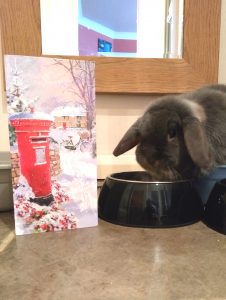Pet Treats and Christmas Hazards
A pet hate for this pet sitter at Christmas are pet treats that clients leave to be unwrapped for their animals on Christmas Day. It is often the case that these festive pet treats contain ingredients that pets have not been served at any other time of the year. So I always advise clients to only give pet treats that their animals have had before or, preferably, not give them at all.
The British Veterinary Association (BVA) , has published a report on the hazards our pets face at Christmas. It says that 81% of vets across the UK saw at least one case of toxic ingestion in pets during the 2016 festive period.
Chocolate poisoning remains the most common cause of toxic ingestion at Christmas for dogs, with 74% of vets seeing at least one case, according to BVA’s Voice of the Veterinary Profession survey. There has also been a spike in raisin or sultana poisoning over the past two years, with 54% vets reporting treating a case during last year’s festive season.
Many cats also suffered toxic ingestion last Christmas, with a quarter of vets treating cats for antifreeze poisoning. Festive decorations, gift wrapping and seasonal plants like lilies and poinsettias are other common reasons for pets landing up at the vet’s:
“Presents, treats and decorations can often prove dangerous for our pets if we are not careful. Many pet owners are aware of the risks of chocolate or other festive foods being toxic for their pets but, as our survey shows, it’s easy to be caught out by a kind gift left under the tree or a treat left out on the table, which curious animals can find hard to resist. Our advice is for givers to tell, and owners to ask, if there is anything edible in gifts and to keep such presents safely out of reach of your pet. If you suspect your pet may have eaten something they shouldn’t, then don’t delay in contacting your local vet.”
Keep Your Pets Safe This Christmas
To keep Christmas merry for the whole household, BVA is urging animal lovers to ensure their home is safe for our pets by following these five simple tips:
- Protect your pet from poisons – a number of festive treats and traditions, such as chocolate, raisins, xylitol (found in sugar free treats), nuts, grapes, liquorice, poinsettia, holly and mistletoe are toxic to cats and dogs.
- Keep decorations out of reach – ribbons, wrapping paper, baubles, tinsel and tree lights can all prove irresistible to cats and dogs but can be very dangerous if broken, chewed or swallowed. Batteries for Christmas gifts also need to be kept safe as, if ingested, they may cause severe chemical burns to the mouth, throat and stomach.
- Forget festive food for pets – we all enjoy a richer diet over Christmas, but fatty foods and Christmas dinners shouldn’t be shared. They can trigger, sickness and diarrhoea or other conditions from gastroenteritis to pancreatitis, so try to stick to your pet’s regular diet and routine. Bones including turkey bones should not be given to pets as they can splinter and puncture the digestive tract.
- Give toys not treats – we all want our pets to share the fun and many of us include a gift for our pet on the shopping list. But too many treats can lead to fat pets which can have serious consequences for their health, so consider opting for a new toy, or a long walk if you want to indulge your pet this Christmas.
- Know where to go – even with all the care in the world, animal accidents and emergencies can still happen. Make sure you’re prepared by checking your vet’s emergency cover provision and holiday opening hours.



Leave a Reply
You must be logged in to post a comment.